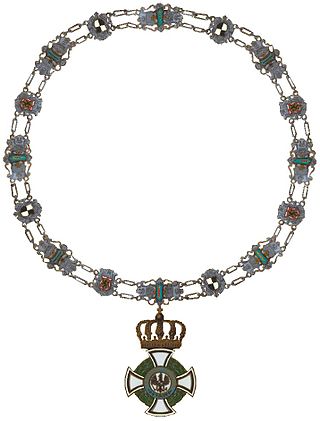
The House Order of Hohenzollern was a dynastic order of knighthood of the House of Hohenzollern awarded to military commissioned officers and civilians of comparable status. Associated with the various versions of the order were crosses and medals which could be awarded to lower-ranking soldiers and civilians.

The Order of Saint Stephen was an order of chivalry founded in 1764 by Maria Theresa. In 1938, Miklós Horthy took the rights and activities of Grand Master as Regent of Hungary. The name of the Order changed to the Royal Hungarian Order of Saint Stephen. The Order was terminated at the time of the proclamation of the Second Hungarian Republic in 1946. It was recreated in 2011 as the Hungarian Order of Saint Stephen, and to this day remains the highest order in Hungary.
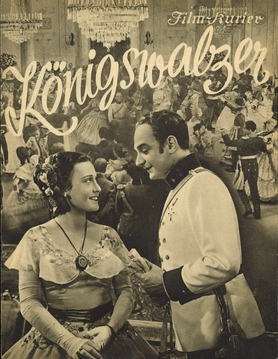
The Royal Waltz is a 1935 German musical film directed by Herbert Maisch and starring Paul Hörbiger, Curd Jürgens, and Carola Höhn. It was shot at the Babelsberg Studios of UFA in Berlin. The film's sets were designed by the art directors Robert Herlth and Walter Röhrig. A separate French-language version Royal Waltz was also released. It was remade in 1955 under the same title.
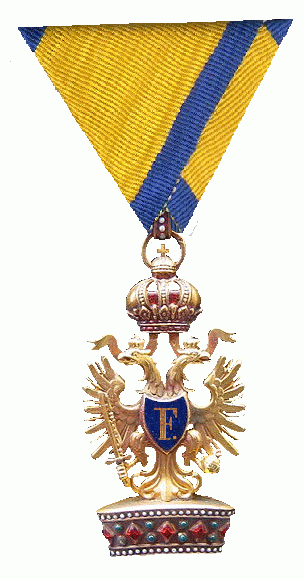
The Imperial Order of the Iron Crown was one of the highest orders of merit in the Austrian Empire and Austria-Hungary until 1918. It was founded in 1815 by Emperor Franz I of Austria as a re-establishment of the original Order of the Iron Crown, which previously had been an order of the Napoleonic Kingdom of Italy.
Whom the Gods Love is a 1942 Austrian historical musical film directed by Karl Hartl and starring Hans Holt, Irene von Meyendorff, and Winnie Markus. The film is a biopic of the Austrian composer Wolfgang Amadeus Mozart. It was made as a co-production between the giant German studio UFA and Wien-Film which had been set up following the German annexation of Austria. The film was part of a wider attempt by the Nazis to portray Mozart as an authentic German hero. Like many German biopics of the war years, it portrays the composer as a pioneering visionary.

The Winemaker of Langenlois is a 1957 Austrian romantic comedy film directed by Hans H. König and starring Herta Staal, Gunnar Möller and Paul Hörbiger.
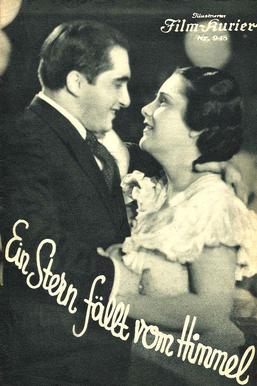
A Star Fell from Heaven is a 1934 Austrian musical film directed by Max Neufeld and starring Joseph Schmidt, Egon von Jordan and Herbert Hübner. It was shot at the Sievering Studios in Vienna. Two years later it was remade in Britain with Schmidt reprising his role. A later German-language film A Star Fell from Heaven released in 1961, was unconnected to the earlier productions.
Rigoletto or The King Amuses Himself is a 1918 Austrian silent historical film directed by Jacob Fleck, Luise Fleck and starring Wilhelm Klitsch, Hermann Benke and Liane Haid. It is based on the 1832 play by the French writer Victor Hugo. To recreate the look of Paris in the early sixteenth century, location shooting took place at the neo-gothic Vienna City Hall.
Don Cesar, Count of Irun is a 1918 Austrian silent historical film directed by Jacob Fleck and Luise Fleck and starring Max Neufeld, Grit Haid and Karl Ehmann. It is based on the opera Don César de Bazan by Philippe Dumanoir and Adolphe d'Ennery, based on an earlier work by Victor Hugo. It was made and released during the closing stages of the First World War.
Eva, The Sin is a 1920 Austrian silent drama film directed by Jacob Fleck and Luise Fleck and starring Liane Haid, Max Neufeld and Karl Ehmann.

The Stain of Shame is a 1917 Austrian silent drama film directed by Jacob Fleck and Luise Fleck and starring Liane Haid, Karl Ehmann and Anton Tiller.
The Tales of Hoffmann is a 1923 Austrian silent film directed by and starring Max Neufeld. The film also features Karl Ehmann, Eugen Neufeld and Robert Valberg.

Maresi is a 1948 Austrian period drama film directed by Hans Thimig and starring Attila Hörbiger, Maria Schell and Siegfried Breuer. It was one of the box offices successes of 1948.

The Heart Must Be Silent is a 1944 German drama film directed by Gustav Ucicky and starring Paula Wessely, Mathias Wieman and Werner Hinz. It was produced by Wien Film in the Austrian capital of Vienna, which had been part of Greater Germany since the Anschluss of 1938. It was given further release by West German distributor Deutsche London Film in 1950.

Schweik's Awkward Years or Schweik's Years of Indiscretion is a 1964 Austrian comedy film directed by Wolfgang Liebeneiner and starring Peter Alexander, Rudolf Prack and Gunther Philipp. It is based on the novel The Good Soldier Schweik by Jaroslav Hasek.

The Happiness of Grinzing is a 1933 Czech musical film directed by Otto Kanturek and starring Iván Petrovich, Gretl Theimer and Alfred Gerasch. It was produced in German and several of the cast and crew had recently left Germany following the Nazi takeover there. It was shot at the Barrandov Studios in Prague. The film's sets were designed by the art director Bohumil Heš. A separate Czech-language version, In the Little House Below Emauzy, was also shot at the same time. Such multiple-language versions were common during the early years of sound film before dubbing became more widespread. In German-speaking parts of Czechoslovakia it was released under the title Das Häuschen in Grinzing.
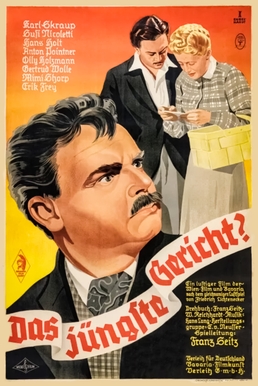
Judgement Day is a 1940 German comedy drama film directed by Franz Seitz and starring Hans Holt, Olly Holzmann and Susi Nicoletti. Location shooting took place in Waidhofen. The film's sets were designed by the art directors Hans Ledersteger and Ernst Richter. It was produced in Vienna by Wien-Film, a company set up following the German annexation of Austria. It was shot at the Rosenhügel and Sievering Studios in the city.












